Papers by Ferdiansyah Thajib
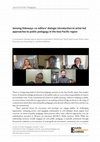
Journal of Public Pedagogies
There is a burgeoning field of artist-led pedagogic practices in the Asia Pacific region that emp... more There is a burgeoning field of artist-led pedagogic practices in the Asia Pacific region that employ forms of shared knowledge production in the public realm as a core ethical responsibility of creative and scholarly work. From community-led archives to public learning, collective studying to public art interventions, and collective approaches to art-making and knowledge production, the range of contexts from which these artist-led public pedagogies arise directly influence their form and the way they are encountered. These artist-led forms for encounter and exchange can engage publics by challenging hegemonies, critiquing power, and engaging communities in civil dialogue about urgent local concerns. As forms of public pedagogy, these practices often value collective approaches over the individualism prevalent in Western art education (KUNCI, 2020a; Jurriens, 2020). While the relationship between socially engaged art and public pedagogy is typically positioned through Eurocentric traditions as an extension of avant-garde art movements, community arts, or popular

This paper chronicles my fieldwork among Muslim queer people in Indonesia. The ethical thrust of ... more This paper chronicles my fieldwork among Muslim queer people in Indonesia. The ethical thrust of "following the heart" lies in the continuous reinvention of research devices in order to keep up with what we feel during, before and after fieldwork, how we are affected by encounters with others, and how others are affected by us. This idea of "following what the heart tells one to do" can be traced back to the old opposition between body and mind, where the head is thought to be rational and cold, and the heart is considered to be emotional and warm. Here, I truncate the metaphor's dichotomous meaning and discuss the potential values of applying it as an ethics of doing affective ethnography in vulnerable settings. Anthropological knowledge production in vulnerable contexts is not only about providing careful interpretation and representation of the affective experiences of our research participants, but also about making ourselves affectively vulnerable as researchers. This ethics is both a method and a source, remaining existentially inscribed into the researchers' embodied realities and continuing to shape our academic practices and everyday livings.
Indonesia and the Malay World, 2021
Feministische Studien, 2020
Against the backdrop of increasing hostility targeting sexual and gender minorities in Indonesia,... more Against the backdrop of increasing hostility targeting sexual and gender minorities in Indonesia, this study analyzes the conterminous relationships between safe spaces and risks of violence within the lives of Indonesian Muslim queers as they reflexively and relationally engage with reparative gestures towards the injurious dimensions of the social world. In my analysis I discern two archetypical safe spaces: a waria beauty salon and an activist camp for youth queers. Respectively, these spatial configurations cater to and accommodate distinct meanings and aspirations attached to the idea of safety. The research protagonists featured in this paper articulate safety in conflicting affective registers, sometimes enabled by tropes of (hetero)normativity in sociopolitical discourse, and at other times constrained by them.
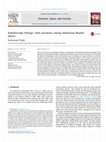
Emotion, Space and Society, 2016
This article explores the unfolding of affective constellations and emotive orientations of Musli... more This article explores the unfolding of affective constellations and emotive orientations of Muslim sexual minorities and transgender people as they deal with different aspects of Islam in the spheres of everyday life. Based on ethnographic research with Muslim queers in Indonesia, the article delineates a landscape of affective practices that is rife with ambivalence. Raymond Williams' (1977) notion of 'structures of feeling' is utilised as an analytical frame to elaborate the expressions and circulations of affect that are not readily captured into a semantic pattern. The deployment of the emotionally charged narratives by the protagonists mainly involves the affective intensities in their experience of cultivating faith amidst constant risks of failure in reproducing religious norms. Three clusters of scenes are foregrounded: how the actors emotively interact with the heteronormative interpellation of religious doctrines; their subjective engagement with spiritual forces; and their experiences of bodily feelings in inhabiting piety and sexuality. Operating through a kaleidoscopic flow, the pairings between the discursive scenes and the articulated feelings of Muslim queers reveal a process of becoming an affective community, which is not only shaped by the distribution of individual affective practices along distinct relation with space and time, but also realised through a commonality in ways of feeling differently.

Debates on homosexuality and religion in Indonesia have moved onto centre stage following recent ... more Debates on homosexuality and religion in Indonesia have moved onto centre stage following recent announcements of two Islamic legal proposals to prosecute nonnormative sexualities in the country. The two developments have been the passing of a criminal bylaw under the Syariah implementation in Aceh Province (Gaystarnews.com, 29/09/2014), which penalises people who are caught engaging in same-sex practices by public caning, and an edict by a member of the Majelis Ulama Islam (MUI – Council of Indonesian Ulama Clerics) (Gaystarnews.com, 15/03/2015), which states that homosexuality is a ’vile act’ punishable by the death penalty. Although these two legal developments proceed through distinct legislative processes and are materialised in different geopolitical settings, my analysis frames them as parts of an Islamic orthodoxy that complement the normative order of sexuality in Indonesia.
PLATFORM: Journal of Media …
Book Chapters by Ferdiansyah Thajib
Dietrich Reimer Verlag eBooks, 2023
Many scholars working on emotion cultures in Indonesian societies have asserted the integral role... more Many scholars working on emotion cultures in Indonesian societies have asserted the integral role of malu (shame or shame-like emotions) in people's everyday interactions (Geertz 1973;
Queer Southeast Asia, 2022
Local Responses to Global Challenges in Southeast Asia, 2022
Local Responses to Global Challenges in Southeast Asia, 2022
Affective Dimensions of Fieldwork and Ethnography, 2019
Some affective trajectories in ethnographic fieldwork continuously blur the lines separating fiel... more Some affective trajectories in ethnographic fieldwork continuously blur the lines separating fieldwork as a personal and a professional undertaking. Field researchers often carry out the multiple tasks of sharing intimate information and engaging in caring relationship with those being studied while balancing their familial, conjugal, sexual, and amical relationships, whether they were separated by physical distance or not. The emotional impacts can be remarkably intricate and ineffable. Moreover, they are often left unexplored or even silenced in the written representation of research outcomes. Intimate attachments and caring experiences in fieldwork are however affective manifestations of relatedness.
Affective Dimensions of Fieldwork and Ethnography, 2019
This introduction explores the role of researchers’ emotions and affects in understanding “the fi... more This introduction explores the role of researchers’ emotions and affects in understanding “the field.” Anthropologists have widely discussed and debated fieldwork reflexivity in terms of fieldwork ethics, methodological practices, colonial traditions inscribed in ethnographic encounters, and modes of ethnographic representation. This chapter focuses on methodological implications that bring to awareness the potentials of researchers’ affects and emotions that less hinder than enable processes of anthropological and social scientific knowledge construction. It extends on classic and recent contributions from psychological and feminist anthropology and aims to provide intellectual space for methodological and epistemological debates, and expound the potentials and the limits of affectively aware scholarship.
Analyzing Affective Societies, Antje Kahl (Ed.), 2019
Peacebuilding in Aceh: Zwischen Tsunami und Scharia, in B. Dengen & A. Flor for Watch Indonesia (Eds.), 2017
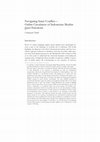
Feelings at the Margins: Dealing with Violence, Stigma and Isolation in Indonesia. Thomas Stodulka & Birgitt Rötgger-Rössler (Eds). Campus Verlag. , Jul 2014
Public acts of intolerance have added new violent dimensions to the debates of homosexuality and ... more Public acts of intolerance have added new violent dimensions to the debates of homosexuality and Islam that have been perpetuating both aspects as contradictory and irreconcilable facets of life in Indonesian Muslim culture. Meanwhile, stories of Muslim queer inhabiting the cleavages between sexuality and piety continue to emerge through various lifeworlds. This article investigates the social phenomena of Muslim queer in Indonesia, through exploring the possibilities and limitations in the deployment of emotives in online interactions. This research highlights the relational aspects Muslim queer emotional struggles towards their subjective well-being amidst social exclusion in an emotional climate that engenders the varying intensities of feelings as shared-experiences among Muslim queer.
.
Buku ini merupakan upaya reflektif Mes 56 membaca diri dan dibaca orang lain setelah lebih dari 1... more Buku ini merupakan upaya reflektif Mes 56 membaca diri dan dibaca orang lain setelah lebih dari 10 tahun berkiprah, dengan mengundang penulis penulis melihat eksistensi Mess 56 dari berbagai sudut pandang, yang lebih luas dari perkara kekaryaan, menempatkan konteks kesejarahan seni dan fotografi. Buku ini disusun berdasar tiga pokok bahasan, yaitu sejarah fotografi di Indonesia, Fotografi dalam konteks seni rupa di Indonesia dan diakhiri oleh upaya reflektif yang bergerak ulang alik melihat sejarah dan pertanyan - pertanyaan mendasar yang mucncul dari perjalanan Mes 56 sendiri.
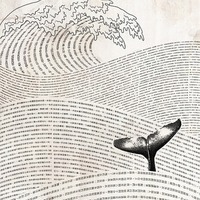
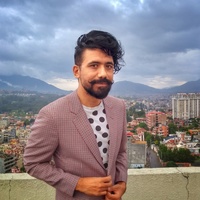






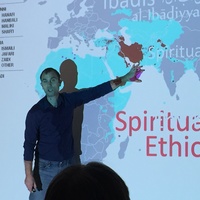
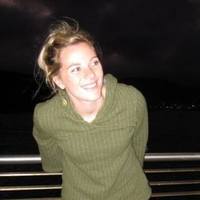
Uploads
Papers by Ferdiansyah Thajib
Book Chapters by Ferdiansyah Thajib
.
.